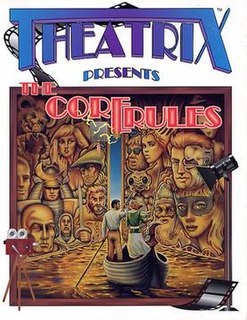Related Research Articles
In some role-playing game (RPG) systems, the dice pool is the number of dice that a player is allowed to roll when attempting to perform a certain action.

The Serenity Role Playing Game is a science fiction role-playing game released in 2005 and set in the universe of the movie Serenity. It was produced by Margaret Weis Productions, Ltd, and its mechanics were the first iteration of the Cortex System. It won an Origins Award for best RPG in 2005 and Margaret Weis' license came to an end on January 31, 2011.
Margaret Weis Productions, Ltd. is a games publisher located in Williams Bay, Wisconsin, United States and founded in 2004 after Margaret Weis and Don Perrin, the two founders of Sovereign Press, Inc divorced.

An attribute is a piece of data that describes to what extent a fictional character in a role-playing game possesses a specific natural, in-born characteristic common to all characters in the game. That piece of data is usually an abstract number or, in some cases, a set of dice. Some games use different terms to refer to an attribute, such as statistic, (primary) characteristic or ability. A number of role-playing games like Fate do not use attributes at all.
In tabletop role-playing games, a plot point is a resource possessed by a player which can be spent to alter the plot of the game. The name is a pun on the TV and film term plot point.

Ghostbusters is a comedy role-playing game designed by Sandy Petersen, Lynn Willis and Greg Stafford and published by West End Games in 1986. It is based on the 1984 film Ghostbusters.

Conspiracy X is a role-playing game (RPG) originally released by New Millennium Entertainment in 1996, and since revised and released by several publishers including Steve Jackson Games and Eden Studios, Inc. In all versions, the setting posits that aliens are insiduously taking over the world, reminiscent of The X-Files.

The Supernatural Role Playing Game is a role-playing game by Margaret Weis Productions that was released in 2009. It is based on the television series Supernatural and was the final game to use the Cortex System.

The Dresden Files Roleplaying Game is a licensed role-playing game based on The Dresden Files and using the Fate system. It was released in late 2010 in two hardcover volumes: Your Story with the rules information and Our World with setting information, and won numerous awards at all of the Origins Awards, the ENnies, and the Golden Geek Awards.

Theatrix is a role playing game that was produced in 1995 by the now-defunct Backstage Press. It was unusual because, unlike most other role-playing games of the time, it did not use dice to resolve actions or determine success.

Marvel Heroic Roleplaying is the fourth role-playing game set in the Marvel Universe published by Margaret Weis Productions under license from Marvel Comics. It uses the Cortex Plus system. The first volume was published in early 2012. In early 2013, Margaret Weis Productions announced that they would not be renewing their license and publication ceased.
The Cortex Plus System is a toolkit RPG system that evolved from Margaret Weis Productions, Ltd's Cortex System. It has been used for four published games and one published preview to date, and the design principles are in the Cortex Plus Hacker's Guide, a book of advice in how to create new games using Cortex Plus, and list of new games produced via Kickstarter. According to the Hacker's Guide there are three basic 'flavors' of Cortex Plus; Action, Drama, and Heroic.

The Smallville Roleplaying Game is a superhero-themed role-playing game published in 2010 by Margaret Weis Productions, and is set in the universe of the television series Smallville. The Smallville Roleplaying Game was the first of the new role-playing games from Margaret Weis Productions to utilize their new Cortex Plus system. The game was co-designed by line developer Cam Banks and indie publisher Josh Roby.

Leverage: The Roleplaying Game is a role-playing game based on the Leverage television series using the Cortex Plus system. It is known for its innovative use of flashback scene to reproduce the con or heist genre and was nominated for the 2010 Origins Award for Best Roleplaying Game.
Cam Banks is a game designer known for his work on the Cortex System line of roleplaying games as lead designer for Marvel Heroic Roleplaying, and the Big Damn Heroes Handbook supplement to the Serenity Role Playing Game, among other titles. He is the Cortex Creative Director for Fandom Tabletop, the publishers of Cortex Prime.

The Battlestar Galactica Role Playing Game is a role-playing game published by Margaret Weis Productions in 2007, based on the Battlestar Galactica franchise.

Jamie Chambers is an American game designer who works primarily on role-playing games, contributing in a variety of genres. He served as Vice President of the non-profit Game Manufacturers Association, a trade association for the hobby games industry, from 2007 until 2016, when he chose not to seek re-election. He succeeded Marcus King for the post. Chambers worked with Margaret Weis at Sovereign Press in 1988, then transitioned with her to Margaret Weis Productions (MWP) where he served as Vice President and Lead Designer. While there, he created the Cortex System, a role-playing game ruleset that has been used by MWP since that time.

The Firefly Role-Playing Game is a science fiction role-playing game released in 2014, written by Monica Valentinelli and set in the universe of the Joss Whedon television show Firefly. It was produced by Margaret Weis Productions, Ltd, and uses the "Cortex Action" variant of Margaret Weis Production's proprietary Cortex Plus game system.

Don't Look Back: Terror is Never Far Behind (DLB) is a supernatural and paranormal horror-themed role-playing game set in modern times that was initially published in 1994 by Mind Ventures.
The Cortex System is a collection of related roleplaying games. Its most recent iteration, Cortex Prime, was designed by Cam Banks and published by Fandom Tabletop. Prior versions appeared in the licensed roleplaying games published by Margaret Weis Productions, where it was used as the house system. Cortex is an adaptable game system focusing on characterization and story development.
References
- ↑ "D6G Episode 18: Serenity RPG reviewed & interview with designer". The D6 Generation. October 30, 2008. Retrieved March 31, 2013.
- ↑ RPG.net review of Cortex Classic
- ↑ Cortex Classic System RPG listing
- ↑ RPG Geek Serenity RPG page
- ↑ 2005 Origins Awards Archived 2013-12-27 at the Wayback Machine
- ↑ SF Weekly review of Battlestar Galactica
- ↑ Book Review: Supernatural role playing game, by Jamie Chambers - the Journal of Transformative Works
- ↑ "Review of Smallville by RPGamer". Archived from the original on 2014-01-02. Retrieved 2014-01-05.